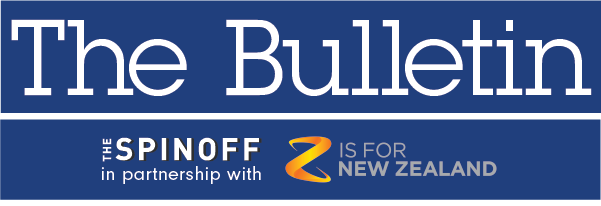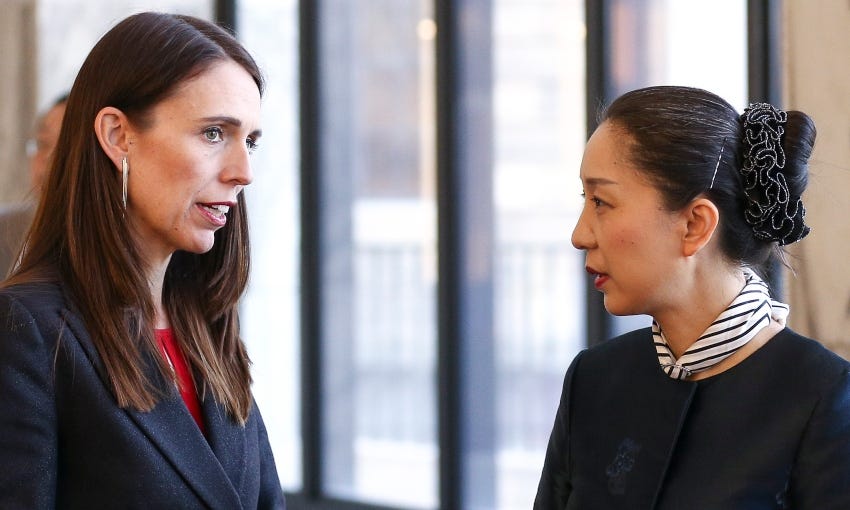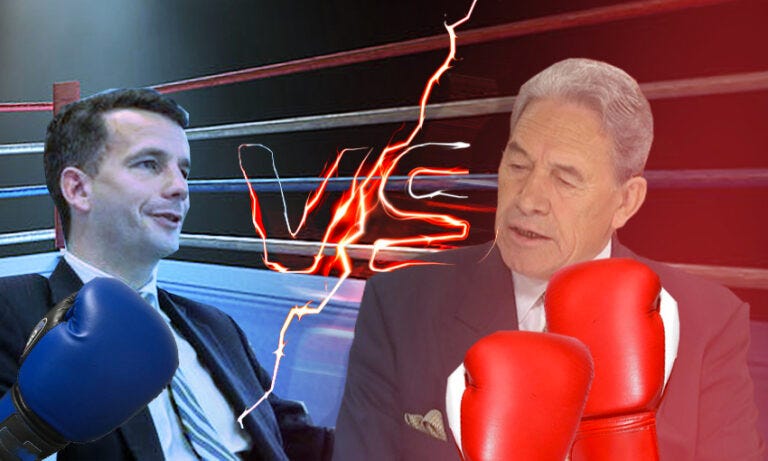Why the relationship with China is so complicated
Seemingly unconnected events like a car crash can have profound ripple effects in other spheres

Good morning and welcome to The Bulletin for Friday 24 July, by Alex Braae for The Spinoff. Presented in partnership with Z Energy.
In today’s edition: Why the relationship with China is so complicated, significant new NPS on urban development, and Stats NZ breaks down emissions by region.

Image: PM Jacinda Ardern speaking with Chinese ambassador Wu Xi (Getty Images)
At long last, there has been a quiet enough day to introduce a more slow-burn topic as a lead story. So today, The Bulletin will focus on a couple of aspects of the relationship between New Zealand and China. It's a very complicated relationship, and in recent weeks there have been some interesting and potentially troubling ripples – whether they signal a new direction for the relationship altogether remains to be seen.
It is clearly a relationship that both parties are hoping to keep as courteous as possible. At the recent China Business Summit in Auckland, both Newsroom's Sam Sachdeva, and Politik's Richard Harman, noted that the diplomatic dancing has been carefully choreographed, with expressions of friendship between the two countries along with clear references to the fact that New Zealand is caught between growing US-China tensions. There were also warnings given by the Chinese ambassador Wu Xi that the New Zealand government should refrain from taking action around the ongoing situation in Hong Kong – where a new security law imposed by Beijing has allowed for a dramatic crackdown on political freedom. At this stage, the NZ government's position on the matter is softer than that of Australia and the US – and that is potentially very useful to the much larger nation at a time when much of the rest of the world is uniting against it.
Much of New Zealand's business community is certainly willing to keep a measured tone on these issues and others of human rights. The NZ Herald's (paywalled) Fran O'Sullivan wrote a flattering piece on China's "commitment to globalisation and multilateralism" on trade, including potentially joining up with the Comprehensive and Progressive Agreement for Trans-Pacific Partnership trade bloc. And the cold hard economic reality right now is that trade with China is keeping the wider economy afloat. As this piece by Michael Andrew notes, an NZEIR report has found our reliance on primary sector exports has served us incredibly well in this particular crisis, because that's largely what China is interested in. The difficult balance between diplomacy and trade was covered in a recent episode of The Detail, by Jessie Chiang.
But with the heavy business reliance on China, there are also fears our domestic politics could become influenced and entangled with theirs. The justice select committee has recently been hearing from various people on the question of Chinese influence over politics – and interestingly, at a local government level as well. Christchurch mayor Lianne Dalziel in particular hit out at what she described as a defamatory allegation against her made in a submission, reports Stuff's Oliver Lewis. The key question is about the degree to which 'United Front' activities are taking place in New Zealand – an alleged network of organisations and individuals that try and influence other countries in a direction that benefits the Chinese government. It is notable that there have been allegations made in this area about those the Serious Fraud Office has charged, in relation to donations made to National.
One major problem with trying to balance these tensions is that seemingly unconnected events can blow everything up. An example of that happened just yesterday – two Chinese dissidents were tragically killed in a car crash near Tokoroa on Tuesday. They were reportedly significant and highly regarded figures in the Chinese community as well, and were on their way to Wellington to deliver a petition to the select committee warning against Chinese government interference. Professor Anne-Marie Brady, who has long warned against such influence, told the select committee yesterday that some in the Chinese community immediately suspected foul play, reports Stuff. Her comments may have been misreported elsewhere, as it doesn't appear she directly accused China of sabotage – rather, she was highlighting that it was a fear within the community, and that the police and SIS should investigate thoroughly.
But it prompted a very strong response nonetheless from the Chinese Embassy. Radio NZ received a statement from them, which decried any suggestion they were involved as groundless. "Our ambassador has made it clear time and time again that China adheres to the principle of non-interference and we have never done anything to interfere with the political system of New Zealand and we have also never done such things as so-called sabotage the Chinese community as alleged by the professor."
An exciting development for The Spinoff: We've now got merch for sale! You can check out everything we've got on offer here, but among other things we've got tea towels, pens, coffee cups, tote bags and T-shirts for sale. You can also buy copies of The Spinoff Book, which we released at the end of last year, featuring dozens of the best pieces of writing to appear on the site over our first five years. And of course, Spinoff Members get a discount on all of it, which you can sign up for here.
Cities could become a lot more dense thanks to a significant new National Policy Statement from urban development minister Phil Twyford. Stuff's Henry Cooke has reported one a few key aspects of the statement, notably the decision to stop councils being able to impose minimum parking requirements, or building height limits on developments in major cities. This could have a massive impact on how cities develop in future, particularly in relation to very dense housing near public transport routes. The impact this could then have on urban carbon emissions is really positive, and dare I say it, it's one of those moves that makes it possible to imagine our cities finally moving into the 21st century.
Speaking of emissions, a new Stats NZ report has broken down the country's emissions by region, and noted where they're going up or down. The NZ Herald's Jamie Morton has put together a comprehensive report, with the top line being that nationwide emissions are only slightly down, at a time when they need to be falling much more sharply to meet targets. The regional approach has some benefits, but as Massey University Distinguished Professor Robert McLachlan argues, "the key point is not the location of the polluter but the development of an overall plan to stop burning fossil fuels."
A fifth woman has now come forward with allegations against disgraced ex-MP Andrew Falloon, reports the NZ Herald. Police have also confirmed they're investigating the matter, but are making no further comment. National leader Judith Collins said the woman brought allegations to her last night, and that she hoped any other possible victims would feel emboldened to also come forward. Meanwhile, the probe into former minister Iain Lees-Galloway is underway, in particular whether he misused any taxpayer funding to maintain his extra-marital relationship, reports Stuff.
A few weeks ago we highlighted a particularly useful and crunchy piece of analysis about National's plan on public finances, by Stuff's Thomas Coughlan. He's followed that up with a new piece on the party's draft debt target if they get into government, which to cut a long story short would either require tax rises, extremely deep and harsh spending and service cuts, or unrealistically heroic economic growth to meet. It's worth noting that at this stage it's just a draft – the Pre-election Economic and Fiscal Update from Treasury still hasn't been released, making firm commitments difficult. Meanwhile, Judith Collins was in the Wairarapa this week to announce the party's transport plans for the region.
The Environment Court will soon hear a very important case around the responsibilities of farmers to preserve native bush. Radio NZ's Katie Todd has covered the case of a Te Anau farmer accused of slashing and burning 800ha of native bush, allegedly in breach of abatement notices and doing irreparable damage to flora and fauna in the process. Southland District Court is now seeking a permanent court order, after a temporary one was granted. The farmer says he will oppose that, and denies having done anything wrong.
Got some feedback about The Bulletin, or anything in the news?
Drop us a line at thebulletin@thespinoff.co.nz

Right now on The Spinoff: I report on an aggrieved local dance company who premiered a new show in March, only to see a BBC short dance film with the exact same name come out this month. Aaron Yap writes about how the NZ Film Festival has changed due to Covid, and whether it will ever go back to how it was. Leonie Hayden speaks to two titans of media about Māori representation in a predominantly Pākehā industry. Our new live updates guy (who is doing an awesome job so far) Stewart Sowman-Lund goes deep into what would actually happen if David Seymour and Winston Peters got in the ring. Sam Brooks reviews the contested heartland of the Wellington CBD known as Courteney Place. And Amanda Thompson reveals the correct way to go about the art of reading the tea leaves.
For a feature today, a horrifying glimpse at the reality of war and those who end up fighting them against their will. German publication Der Spiegel has profiled two young men who fought on opposite sides of the war in Syria – and now fight against each other as mercenaries in the conflict in Libya. What the piece hammers home is that whether they like it or not, they are now just pawns in the geopolitical games of others. Here's an excerpt:
Friends in Syria accuse him of having sold out the revolution to earn money in Libya. But even if he wanted to, Adnan complains, he couldn't simply quit. The Turks, he says, only allow the injured to go home, which is why some of his comrades have shot themselves in the leg. Others, he says, have boarded refugee boats in the hopes of making it to Europe. Adnan says that he would also try to get to Europe if he didn't have children in Turkey. "I have no other choice than to keep fighting," he says.
Adnan's compatriot Muhammad is on the other side of the front in Libya. But he, too, has the feeling that he no longer controls his own destiny and that he is under the control of foreign powers. His primary motivation for speaking to DER SPIEGEL was to highlight the experience of Syrians in Libya. Like Adnan, he has declined to provide his last name out of fear of repercussions.
Muhammad's life has been dominated by war. He was still a young man when he joined the Desert Falcons, a militia organization that fought alongside the Assad regime against the rebels. A few years ago, the Desert Falcons were disbanded as a result of internal power struggles, with remnants of the militia joining an army unit that was armed and controlled by Russia, Assad's most important ally. Since then, Muhammad has answered to Moscow.
In sport, there's only one game to watch this weekend. The Parliamentary Rugby team will be playing a 25th anniversary match over the hill in Wainuiomata, against the Centurions Rugby Club. You can watch it on the facebook page of the Pick up the Pace podcast, and the game will feature the likes of Dr Ashley Bloomfield (under the stage name of The Eliminator) MPs Damian O'Connor and Mark Mitchell, and former All Blacks Piri Weepu and Tamati Ellison. Kick off is at 2.30 on Saturday.
That's it for The Bulletin. If you want to support the work we do at The Spinoff, please check out our membership programme




